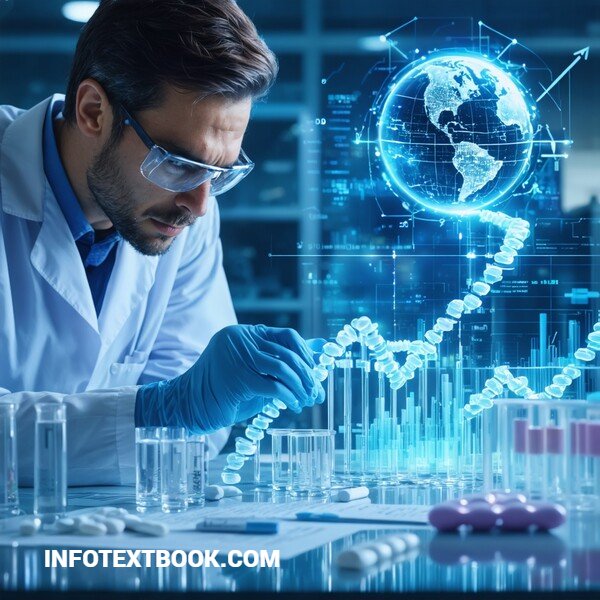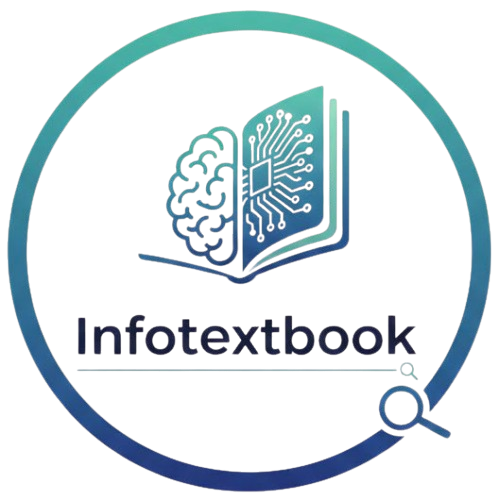Table of Contents
ToggleDigital Biotechnology Revolutionizing Healthcare, Research & Innovation
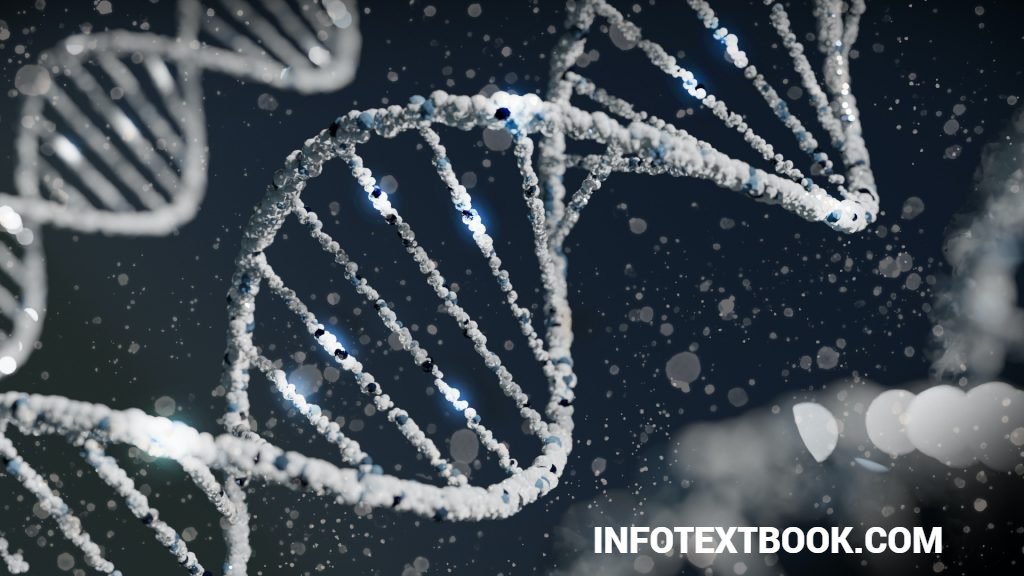
1. Introduction to Digital Biotechnology
Digital Biotechnology is transforming the way we understand and apply biological sciences. By combining biology with advanced digital technologies, it enables researchers and industries to accelerate discoveries, enhance precision, and create innovative solutions for global challenges. From healthcare to agriculture, Digital Biotechnology is paving the way for breakthroughs that were once impossible.
2. Importance of Digital Biotechnology in Modern Science
The integration of biology with digital tools such as AI, cloud computing, and big data analytics allows scientists to analyze complex biological processes faster and more accurately. Digital Biotechnology is essential for solving problems in genomics, personalized medicine, and vaccine development. Its importance lies in reducing time, cost, and risk in research and development, making it a cornerstone of modern science.
3. Key Applications in Healthcare and Research
Digital Biotechnology has vast applications, including:
Genomic Data Analysis for personalized treatments
Protein Structure Prediction to develop targeted therapies
Synthetic Biology to engineer microorganisms
Digital Health Solutions for better disease management
By leveraging these applications, Digital Biotechnology is accelerating innovation and improving outcomes for patients worldwide.
4. Digital Biotechnology in Drug Discovery and Development
Drug discovery is one of the most resource intensive processes in healthcare. With Digital Biotechnology, pharmaceutical companies can use AI-powered algorithms and computational biology tools to predict drug behavior, reduce trial failures, and optimize clinical research. This not only speeds up drug development but also makes treatments more accessible and affordable.
5. Role of AI & Data Analytics in Digital Biotechnology
Artificial Intelligence plays a crucial role in analyzing massive biological datasets. AI-driven algorithms help predict gene functions, design proteins, and create digital twins for experiments. Data analytics ensures accuracy and reliability, making Digital Biotechnology an indispensable tool for researchers.
6. Future Trends and Opportunities
The future of Digital Biotechnology looks promising with trends like:
AI driven synthetic biology
Cloud based genomic platforms
Digital twins for cells and organs
Integration with nanotechnology and robotics
These advancements will shape industries such as pharmaceuticals, agriculture, and environmental science, leading to sustainable and efficient solutions.
Introduction to Digital Biotechnology
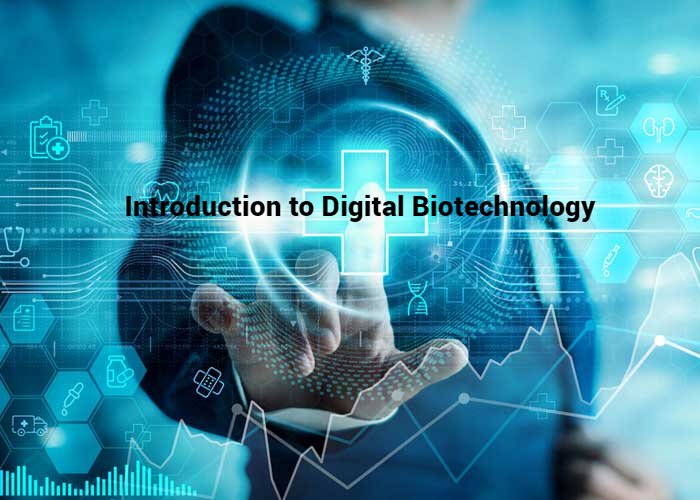
Introduction to Digital Biotechnology
Digital Biotechnology is a rapidly emerging field that combines biology, computer science, artificial intelligence (AI), and data analytics to create powerful tools for research, healthcare, and industry. It represents the next stage in the evolution of biotechnology, where digital technologies enable scientists to analyze complex biological systems more efficiently and accurately than ever before. With vast amounts of genomic, proteomic, and clinical data being generated daily, Digital Biotechnology offers innovative ways to process, interpret, and apply this information for groundbreaking discoveries.
One of the major driving forces behind Digital Biotechnology is the integration of artificial intelligence. AI algorithms can process massive datasets, identify hidden patterns, and generate predictive models that guide decision-making in drug development, precision medicine, and genetic engineering. For example, AI-assisted drug discovery uses deep learning to predict how molecules interact with biological targets, significantly reducing the time and cost of clinical trials. This makes Digital Biotechnology a vital resource for healthcare companies and researchers worldwide.
In addition to drug discovery, Digital Biotechnology is revolutionizing genomics. The ability to sequence entire genomes quickly has created enormous amounts of data that require advanced computational tools to manage. AI and cloud computing allow scientists to analyze genetic variations, predict disease risks, and develop personalized treatment plans. This is especially important in precision medicine, where therapies are designed to match an individual’s unique genetic profile.
Another exciting application of Digital Biotechnology is in synthetic biology, where digital tools help design and engineer biological organisms with specific functions. From creating bacteria that produce sustainable biofuels to designing crops resistant to climate stress, the combination of AI and biotechnology is unlocking solutions for global challenges in food, energy, and the environment.
Moreover, Digital Biotechnology supports virtual biology labs and simulation platforms. These tools allow researchers to test hypotheses in silico before conducting expensive laboratory experiments, saving time and resources while improving safety.
Importance of Digital Biotechnology in Modern Science
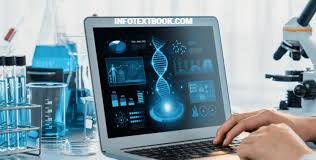
Importance of Digital Biotechnology in Modern Science
Digital Biotechnology has emerged as one of the most powerful forces reshaping modern science, combining the principles of biology with advanced digital technologies. In a world driven by data and innovation, this field is creating new opportunities for healthcare, agriculture, pharmaceuticals, and environmental research. The importance of Digital Biotechnology lies in its ability to accelerate discoveries, reduce research costs, and provide solutions that are both scalable and precise.
One of the key reasons Digital Biotechnology is important in modern science is its ability to analyze massive datasets. Traditional biology often relies on laboratory experiments that are time-consuming and resource-intensive. With digital tools, scientists can simulate experiments, predict outcomes, and make data driven decisions before moving to practical applications. This significantly shortens the research timeline and reduces the risk of errors, allowing faster innovation.
In healthcare, Digital Biotechnology plays a vital role in personalized medicine, vaccine development, and drug discovery. For example, genomic sequencing combined with artificial intelligence enables doctors to create tailored treatment plans for individual patients. By using computational models, researchers can predict how a drug will interact with the human body, reducing trial failures and improving patient safety. Such advancements make modern medicine more efficient, accurate, and accessible to people worldwide.
Beyond healthcare, Digital Biotechnology has major applications in agriculture and environmental science. By using digital simulations, researchers can develop stress-resistant crops, optimize farming techniques, and reduce environmental impact. Similarly, in climate studies, digital models help understand the role of microorganisms in ecosystems, enabling the design of sustainable solutions for global challenges.
Another important aspect of Digital Biotechnology is its ability to integrate with other technologies such as artificial intelligence, cloud computing, and robotics. These integrations open up possibilities for creating digital twins of cells, organs, or even entire organisms, allowing researchers to run virtual experiments that would be impossible in a traditional lab setting. This synergy between biology and technology ensures that modern science remains at the forefront of innovation
Key Applications in Healthcare and Research
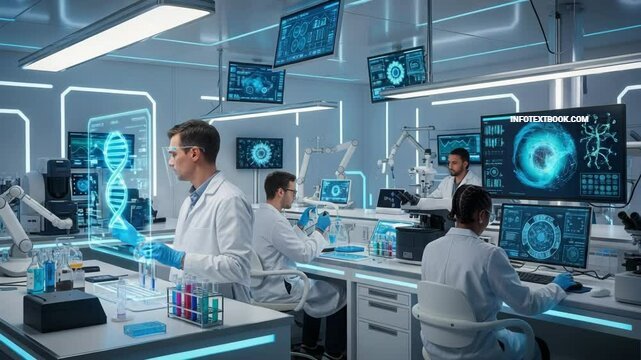
Key Applications in Healthcare and Research
Digital Biotechnology is reshaping healthcare and research by integrating advanced digital tools with biological sciences. This powerful combination allows scientists, doctors, and researchers to accelerate discoveries, reduce risks, and develop innovative solutions that directly impact human health and well-being.
One of the most significant applications is in genomic research, where Digital Biotechnology enables the analysis of vast amounts of genetic data. By decoding DNA sequences faster and more accurately, researchers can identify genetic mutations, predict disease risks, and design personalized treatment plans. This is a crucial step toward the future of precision medicine, where therapies are tailored to an individual’s genetic makeup rather than a one-size-fits-all approach.
Another key area is drug discovery and development. Traditional drug research often takes years and involves high costs with uncertain outcomes. With the help of Digital Biotechnology, pharmaceutical companies can now simulate drug interactions using AI models and computational biology. This reduces trial failures, shortens development cycles, and increases the success rate of new medicines. As a result, patients gain quicker access to life-saving treatments at more affordable costs.
Synthetic biology is also advancing rapidly due to digital integration. Researchers can now design and engineer microorganisms for various purposes, such as producing biofuels, creating sustainable agricultural solutions, and developing new vaccines. Digital modeling helps predict how these engineered organisms will behave, making the process safer and more efficient.
In clinical research, Digital Biotechnology enhances the monitoring and analysis of patient data through wearable devices and digital health platforms. Doctors can track real-time health metrics, detect early warning signs of diseases, and adjust treatments based on continuous feedback. This not only improves patient outcomes but also reduces the burden on healthcare systems.
Furthermore, AI and machine learning play a vital role in analyzing complex biological datasets. By uncovering hidden patterns, AI-powered systems support breakthroughs in cancer research, neurological studies, and infectious disease control.
Digital Biotechnology in Drug Discovery and Development
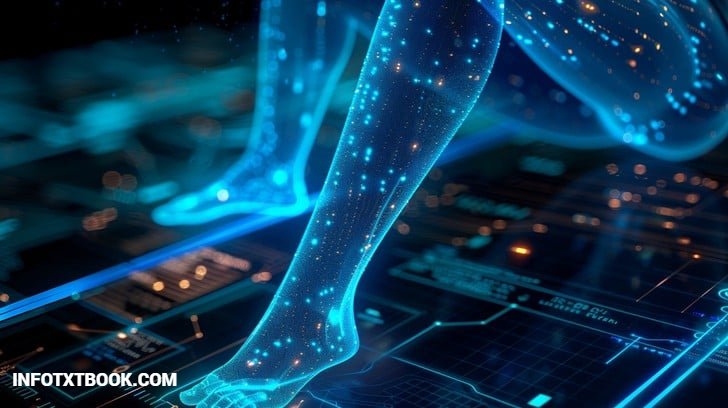
Digital Biotechnology in Drug Discovery and Development
Drug discovery and development have always been long, expensive, and complex processes. Traditional methods rely heavily on trial and error, consuming years of research and billions of dollars before a drug reaches the market. Today, Digital Biotechnology is revolutionizing this landscape by integrating biology with advanced digital tools, accelerating breakthroughs, and reducing costs.
One of the most significant contributions of Digital Biotechnology is in predictive modeling. With the help of artificial intelligence and machine learning, researchers can now simulate how a drug will interact with human cells or proteins before entering clinical trials. This approach drastically minimizes the chances of failure, saving both time and resources. Computational biology tools can analyze thousands of compounds in silico, identifying potential candidates faster than ever before.
Another key aspect is genomic data analysis. Personalized medicine is becoming a reality because scientists can decode genetic information and design therapies tailored to individuals. Digital Biotechnology allows researchers to process massive datasets, uncover genetic variations, and predict responses to specific drugs. This precision reduces side effects and improves treatment outcomes.
Cloud-based platforms and high-performance computing also play a vital role in making collaboration easier across pharmaceutical companies, biotech startups, and academic institutions. Researchers can share biological data securely, run simulations, and test hypotheses virtually. This global connectivity accelerates innovation and reduces duplication of effort.
In clinical development, digital tools improve efficiency by enabling virtual clinical trials. These digitally managed trials help monitor patient responses in real time, enhancing accuracy and safety while lowering overall costs. Moreover, wearable devices and digital biomarkers are making it possible to collect continuous patient data, further improving the reliability of drug testing.
Looking ahead, the integration of robotics, nanotechnology, and synthetic biology with digital systems will push drug discovery into new dimensions. The future will see drugs being designed, tested, and optimized virtually before entering laboratories, dramatically reducing development timelines
Role of AI & Data Analytics in Digital Biotechnology
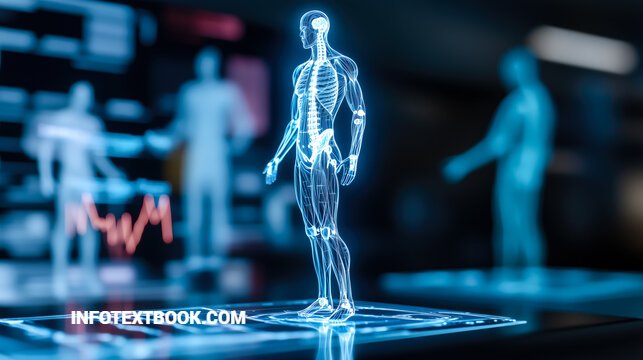
Role of AI & Data Analytics in Digital Biotechnology
Artificial Intelligence (AI) and Data Analytics have become the backbone of Digital Biotechnology, driving innovation and transforming how biological research is conducted. With the increasing availability of genomic data, medical records, and laboratory outputs, traditional research methods are no longer sufficient to manage such massive volumes of information. This is where AI and advanced analytics provide unmatched advantages.
AI in Digital Biotechnology is primarily used for pattern recognition, predictive modeling, and automation of complex processes. For instance, deep learning algorithms can analyze DNA sequences to identify potential genetic disorders or predict the function of unknown genes. Similarly, AI-powered simulations allow researchers to design proteins, test drug interactions virtually, and optimize experiments before moving to physical trials. This not only reduces costs but also speeds up the discovery process significantly.
Data Analytics, on the other hand, plays an equally vital role in making sense of the vast amounts of biological data generated daily. Researchers use analytics to clean, structure, and interpret data from sequencing, imaging, and clinical studies. By identifying trends and correlations, data analytics helps uncover new insights into disease mechanisms, treatment pathways, and patient responses. This empowers healthcare providers to deliver more personalized medicine, tailored to an individual’s genetic and biological profile.
One of the most promising applications of AI and Data Analytics in Digital Biotechnology is drug discovery. Machine learning algorithms can scan billions of chemical compounds and predict which ones are most likely to succeed as drug candidates. This drastically reduces the time and resources spent in traditional trial and error methods. Furthermore, the integration of cloud computing enables real-time data sharing among global research teams, accelerating collaboration and innovation.
Another key area is digital twins in biotechnology. By creating virtual models of cells, tissues, or even entire organs, researchers can test hypotheses in a risk free environment. Combined with data analytics, these digital twins provide insights that were once impossible to achieve in conventional labs
Future Trends and Opportunities in Digital Biotechnology
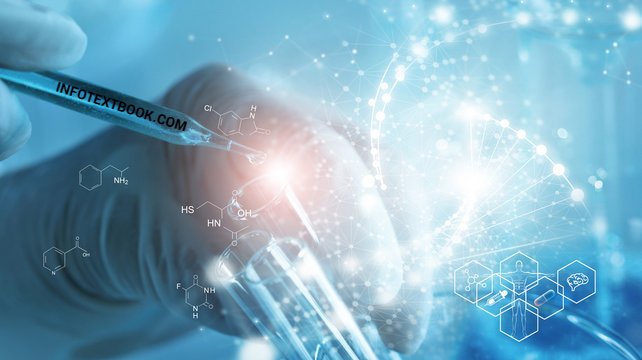
Future Trends and Opportunities in Digital Biotechnology
The future of science and healthcare is being reshaped by Digital Biotechnology, a field that merges biology with advanced digital tools to create groundbreaking solutions. As technology continues to evolve, new opportunities are emerging that will define the next era of innovation.
One of the most significant trends is the rise of AI-driven biological research. Artificial Intelligence can analyze complex biological data faster than traditional methods, making it possible to design proteins, predict genetic outcomes, and accelerate drug discovery. Combined with machine learning, AI ensures that researchers can achieve higher accuracy in a fraction of the time. This integration will make Digital Biotechnology a critical driver of precision medicine and next-generation therapies.
Another key trend is the use of digital twins in biology. By creating virtual models of cells, tissues, or even entire organs, scientists can run experiments in silico before applying them in the real world. This approach reduces risks, lowers costs, and speeds up research. In healthcare, digital twins could be used to predict patient responses to treatments, leading to highly personalized care.
The growth of cloud-based genomic platforms is also shaping the future. These platforms allow researchers worldwide to collaborate, store, and analyze vast amounts of genomic data securely. With improved accessibility, breakthroughs in genomics, synthetic biology, and vaccine development will accelerate, further strengthening the role of Digital Biotechnology in global health.
Sustainability is another area where Digital Biotechnology will play a vital role. By engineering microorganisms, scientists can produce eco-friendly fuels, biodegradable plastics, and sustainable agricultural solutions. This not only supports environmental goals but also reduces reliance on non-renewable resources.
Opportunities also extend into agriculture, where smart farming solutions powered by digital tools and biotechnology will enhance crop yields, resist climate challenges, and improve food security. Industries ranging from pharmaceuticals to environmental science will benefit from these advancements.
Looking ahead, the convergence of nanotechnology, robotics, and biotechnology will open new possibilities. Nanobots powered by biological principles may one day deliver drugs at the cellular level, while robotics could automate complex lab procedures.
Final Thoughts

Final Thoughts
Digital Biotechnology is rapidly reshaping the future of science, healthcare, and industry. By blending biological research with cutting-edge digital tools such as artificial intelligence, big data analytics, and cloud computing, it creates opportunities that were unimaginable a decade ago. From accelerating drug discovery to enabling precision medicine, Digital Biotechnology is proving to be a game-changer across multiple domains.
One of its most significant contributions is in healthcare, where it helps in understanding diseases at a molecular level, designing targeted therapies, and even predicting treatment outcomes. In agriculture, Digital Biotechnology supports sustainable farming practices and improved crop genetics. In environmental science, it offers innovative solutions to tackle climate change and resource management.
The future will see even deeper integration of AI, robotics, and nanotechnology with Digital Biotechnology, making biological systems more predictable, controllable, and scalable. This evolution promises to revolutionize not only medical research but also industries ranging from food production to energy.
As global challenges grow more complex, the role of Digital Biotechnology will become even more vital. It holds the power to drive innovation, save lives, and create a sustainable balance between technology and biology for generations to come
FAQs Digital Biotechnology
Q1. What is Digital Biotechnology?
Digital Biotechnology is the integration of biological research with digital technologies such as AI, big data analytics, and computational modeling to improve scientific research, healthcare, and industrial applications.
Q2. How is Digital Biotechnology used in healthcare?
It helps in drug discovery, personalized medicine, disease modeling, genomic analysis, and developing AI driven treatment strategies, making healthcare faster, more accurate, and cost-effective.
Q3. What role does AI play in Digital Biotechnology?
AI analyzes massive biological datasets, predicts gene functions, models proteins, and simulates experiments digitally, accelerating research and improving accuracy in biological studies.
Q4. Can Digital Biotechnology help in agriculture?
Yes. It enables precision farming, crop improvement through genetic modeling, and sustainable agricultural practices, improving yield and efficiency while reducing environmental impact.
Q5. What are the future trends in Digital Biotechnology?
Future trends include AI-driven synthetic biology, digital twins of cells and organs, cloud-based genomic platforms, integration with robotics, and nanotechnology applications.
Q6. Why is Digital Biotechnology important for research and innovation?
It reduces time, cost, and risk in experiments, enables high-precision predictions, and fosters innovations across healthcare, pharmaceuticals, agriculture, and environmental science.

